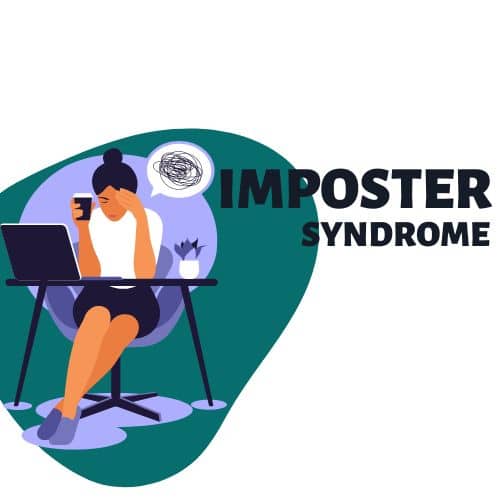Healthy Habits for Professional Productivity and Well-Being
Welcome back to our Healthy Habits series. Today, we will discuss Imposter Syndrome, a well-known but uncomfortable self-esteem issue that affects all aspects of our lives, especially work. As the Director of Behavioral Health at Lyric Health, I’ve personally seen in my day-to-day practice many patients struggle with unmanaged imposter syndrome and how it can become the bane of our existence as it feeds into persistent self-doubts about our abilities and accomplishments, fueling the anxiety and fear that we are being judged by others as fakes or unqualified for our jobs.
What is most fascinating is that we often feel we are the only person with imposter syndrome. However, that is the furthest thing from the truth. The reality is that most of us have imposter syndrome, and it waxes and wanes depending on the situation and our coping mechanisms. According to the Journal of General Internal Medicine (Bravata, D.M., et. al.2023), up to 82% of people face feelings of impostor phenomenon, struggling with the sense that they haven’t earned what they’ve achieved and are a fraud.
Even though imposter syndrome can affect workers across all educational levels and positions, the employees or professions with higher levels of merit may experience it the most. A KPMG study found that 75% of female executives across industries have experienced imposter syndrome in their careers. And according to a Stanford Medicine study, physicians experience impostor syndrome more often than other U.S. workers (Moskal, 2022).
Imposter syndrome not only affects those in the general workplace but also in the arts. Even the most famous musicians have struggled with Imposter Syndrome. In a 2011 HBO special, Lady Gaga confessed,
“I still sometimes feel like a loser kid in high school, and I just have to pick myself up and tell myself that I’m a superstar every morning so that I can get through this day and be for my fans what they need for me to be.”
After the release of her album “30”, Adele told her audience she agreed to headline Glastonbury (theater) despite being terrified.
“Because I’ve got Impostor Syndrome.”
It’s more common than you would think. Entrepreneur magazine wrote about this years ago when they published an article about 12 leaders who struggle with Imposter Syndrome.
THERE ARE MANY DIFFERENT WAYS THAT WE MANIFEST IMPOSTER SYNDROME AT WORK:
- You think your accomplishments are based on luck rather than effort.
- You doubt your abilities.
- You constantly believe that you are faking it.
- You don’t accept compliments because you think your co-workers, friends, and family are just being friendly.
- You constantly discredit your achievements.
- You believe failure is not OK.
- You use minimizing language like “kind of” or “pretty sure,” so you don’t have to commit to statements or risk being incorrect.
- You are constantly looking for validation.
If not addressed or managed, the negative thinking that comes from imposter syndrome can affect an employee’s wellness. This constant state of self-doubt can lead to undue stress, anxiety, procrastination, decreased productivity, depression, and even burnout.
Of course, over time, these symptoms or behaviors become the perfect storm for hindering career growth and job satisfaction. According to HRD America (October 2023), 59% of business leaders have seriously considered leaving their jobs because of self-doubt.
THERE ARE, OF COURSE, VERY EASY AND PRODUCTIVE WAYS TO MANAGE IMPOSTER SYNDROME:
- Time Machine. When feeling fearful or doubtful of your abilities to complete a task or assignment, take a moment and look back on similar situations in which you were able to marshal your forces and overcome the challenge before you. You’ve done it repeatedly, and of course, you will be able to do it now.
- Remind yourself of your achievements. Keep complimentary letters, emails, or awards in your office. It’s not bragging or showing off but a good reminder that your achievements are real and deserved.
- Remind yourself of the three little letters: Y-E-T. “Whenever you feel inadequate or intimated about a work task or new challenge, add Y-E-Ton to the end of that thought. For example, “I don’t know how to do this task, YET!”
- Mistakes are OK. We are all human, and we all make mistakes. Experts agree that we learn our greatest lessons from our mistakes rather than our successes. So don’t be afraid to make mistakes; embrace and grow from them.
- Don’t go dark. When things don’t go right, or you make a mistake, don’t engage in catastrophic thinking, such as “OMG, I’m going to be fired!” “I will never get another high-level assignment!” “They think I am a failure!” The reality is that unless there is gross negligence in your work, you will have plentiful opportunities to grow and do better.
- Build a strong support system. Align yourself with a combination of new and experienced co-workers who can help support you through your self-doubts. Having a fellow employee who is brand new to the workplace and is having similar challenges lets you know that you are not alone in your anxiety. At the same time, having more experienced colleagues on the team who can help guide you will help you build your self-confidence.
- Finally, Find a mentor and/or sponsor. Mentors and sponsors are extremely important because they can share their own stories of self-doubt while modeling successful behaviors.
Of course, the lesson here is that just because you have imposter syndrome does not mean you cannot succeed. As long as you manage your imposter syndrome, you can also realize success.
JEFF GARDERE – AMERICA’S PSYCHOLOGIST
Dr. Jeff is a monthly contributor for Lyric Health and one of the most widely sought-after experts in the mental health field.


